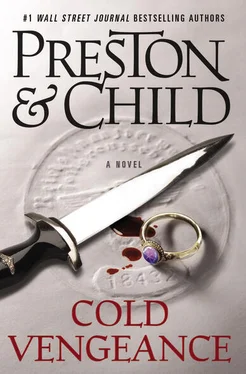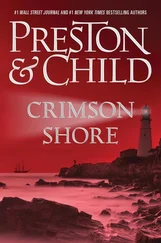Douglas Preston - Cold Vengeance
Здесь есть возможность читать онлайн «Douglas Preston - Cold Vengeance» весь текст электронной книги совершенно бесплатно (целиком полную версию без сокращений). В некоторых случаях можно слушать аудио, скачать через торрент в формате fb2 и присутствует краткое содержание. Год выпуска: 2011, ISBN: 2011, Жанр: Триллер, на английском языке. Описание произведения, (предисловие) а так же отзывы посетителей доступны на портале библиотеки ЛибКат.
- Название:Cold Vengeance
- Автор:
- Жанр:
- Год:2011
- ISBN:978-0-446-57600-0
- Рейтинг книги:5 / 5. Голосов: 1
-
Избранное:Добавить в избранное
- Отзывы:
-
Ваша оценка:
- 100
- 1
- 2
- 3
- 4
- 5
Cold Vengeance: краткое содержание, описание и аннотация
Предлагаем к чтению аннотацию, описание, краткое содержание или предисловие (зависит от того, что написал сам автор книги «Cold Vengeance»). Если вы не нашли необходимую информацию о книге — напишите в комментариях, мы постараемся отыскать её.
Cold Vengeance — читать онлайн бесплатно полную книгу (весь текст) целиком
Ниже представлен текст книги, разбитый по страницам. Система сохранения места последней прочитанной страницы, позволяет с удобством читать онлайн бесплатно книгу «Cold Vengeance», без необходимости каждый раз заново искать на чём Вы остановились. Поставьте закладку, и сможете в любой момент перейти на страницу, на которой закончили чтение.
Интервал:
Закладка:
The old man rubbed his sunburned forehead and chuckled. “I always like to play a round before getting down to any kind of business. Tells me all I need to know about my partner. Now, I’ve noticed improvement on your last few holes. Just remember to follow through on your swing, like I showed you.”
Grabbing his driver, Weiss stumped over to the tee. Bracing himself on the crutches, he drew the club back, then swung it down in a perfect arc. The ball shot into the air with a crack , curving gracefully to the right and out of sight beyond the fringe of trees.
Pendergast watched, then turned to Weiss. “No ‘luck’ in that shot.”
Weiss slapped the crutches and braces. “I’ve had plenty of years with these things to perfect it.”
Pendergast stepped up to the tee, lined up his driver, and took the shot. The club impacted the ball with too open a face and what was meant as a fade turned into something more like a slice.
The older man shook his head, clucking in sympathy but hardly able to conceal his delight. “May have to go searching for that one.”
Pendergast thought for a moment and then asked, “I suppose you wouldn’t consider allowing me a mulligan?” He already knew the answer but was curious to hear Weiss’s reaction.
“Mr. Pendergast, you surprise me. I wouldn’t have pegged you for the mulligan type at all.”
The ghost of a smile lingered on Pendergast’s face as Weiss eased himself back into his wheelchair while unlocking the leg braces. His heavily muscled arms propelled him along, almost shooting him forward along the gravel path. It was a facet of the Nazi-hunter’s forceful personality that he spurned the luxury of a golf cart, preferring to wheel himself over the course. It had been a long eighteen holes, but he showed no sign of fatigue.
As they made their way down the fairway and around the dogleg, their balls came into view: Weiss’s lined up nicely for a shot to the green, Pendergast’s in a sand trap beside the fringe.
Weiss shook his head again. “Your honor.”
Pendergast took a calculating stroll around the bunker, then knelt beside the ball, estimating the trajectory to the pin. He waited for Weiss to issue his recommendation.
“If I were you, I’d choose the lob wedge,” Weiss said after a moment. “It’s more forgiving than the pitching wedge.”
Pendergast rummaged through the set of Pings, took out the wedge, lined himself up gingerly, took a few practice swings, and then — with a huge spray of sand — hit the ball. The ball moved about two feet up the side of the bunker.
Weiss tut-tutted. “Don’t think about it too much. Try to imagine the feel of the shot physically before you swing.”
Pendergast lined himself up again. This time, he hit a more controlled chip shot that seemed to go long but, with heavy backspin, landed with barely a roll on the back side of the green.
“ Mazel tov! ” Weiss cried, beaming.
“Pure luck, I’m afraid,” said Pendergast.
“Ah, but you said you didn’t believe in luck. No — you followed my suggestion and now you see the excellent result.” Selecting a seven iron, Weiss chipped his ball to within ten feet of the pin. Pendergast, at twenty feet, missed his first two putts, then holed out for a bogey. Weiss one-putted for a final eagle.
Pendergast marked it and handed the scorecard to Weiss. “You shot a sixty-nine. My congratulations.”
“It’s my home course. And I’m sure if you follow some of those tips I mentioned, you’d improve quickly. You have a natural golfer’s physique. Now let us talk.”
The formality of the game completed, they repaired to his house, just off the tee box of the fifteenth hole. The two men sat on the patio while Heidi, Weiss’s wife, brought them a pitcher of mint juleps.
“And so to business,” Weiss said, in a rare mood, pouring out the drinks and raising his glass. “So you have come to me about Wolfgang Faust.”
Pendergast nodded.
“Then you have come to the right man, Mr. Pendergast. I made it my life’s work to track down the Dachau Doctor. I was only stopped by these .” And he gestured at the legs under the blanket. Putting down the drink, he reached for a thick folder that sat at one edge of the patio table. “A lifetime of work, Mr. Pendergast,” he said, patting the folder. “Distilled between these covers. And I know it by heart.” He took a deep sip of his julep. “Wolfgang Faust was born in Ravensbrück, Germany, in 1908 and attended the University of Munich, where he met and became the protégé of Josef Mengele, three years his senior. He worked as Mengele’s assistant at the Institute for Hereditary Biology and Racial Hygiene in Frankfurt. In 1940, he received his medical degree and joined the Waffen-SS. Later, at Mengele’s recommendation, he worked for Mengele in the clinic block at Auschwitz. You know the kind of ‘work’ Mengele was involved with?”
“I have an idea.”
“Brutal, cruel, and inhuman surgeries — frequently done without anesthesia.” Weiss’s open and cheerful countenance had undergone a transformation into something hard, implacable. “Unnecessary amputations. Hideously painful and disfiguring medical ‘experiments’ performed on little children. Shock treatment. Sterilization. Brain surgery to alter one’s perception of time. Injecting subjects with various poisons and diseases. Freezing people to death. Mengele was fascinated by anything unusual or abnormal: heterochromia, dwarfism, identical twins, polydactyly. Romas — Gypsies — were a favorite target. He infected a hundred of them with leprosy in an attempt to create a biological weapon. And when his fiendish experiments were complete, he would kill the sufferer — often with an injection of chloroform into the heart, to finish up with an autopsy to document the pathology — just like lab rats.”
He took another slug of his drink. “Faust so distinguished himself at Auschwitz that he was sent to Dachau to set up his own facility. Not a great deal is known of the nature of his Dachau experiments — Faust was far more successful than Mengele at destroying his records and killing witnesses — but what we do know is as disturbing as Mengele’s atrocities, if not more so. I will not speak of those details here; they are in this folder if you really want to know the true depths to which a man’s depravity can lower him. Let us talk instead of what happened after the war. After the fall of Berlin, Faust went underground in Germany with the help of Nazi sympathizers, hidden in an attic — ironically, not that different from what happened to Anne Frank. These sympathizers were well connected or well funded, or perhaps both.”
“How do you know?”
“They had the ability to create — or procure — forged documents of a very high quality. Marriage licenses, identity papers, the like. These sympathizers gave Faust a phony passport in the name of Wolfgang Lanser. Sometime in the late 1940s — it is not known precisely when — he was smuggled out of the country and shipped off to South America. His first port of call was Uruguay. All this — what I have told you so far — took me ten years of work to uncover.”
Pendergast inclined his head.
“He settled in a series of remote towns, earning money from doctoring the peasants, but it appears he was not long welcome in any one place; apparently his prices were extortionate, and at times he displayed a propensity for trying out various, ah, cures that often ended up killing instead.”
“The inveterate experimenter,” Pendergast murmured.
“By 1958, I had tracked him to Uruguay. Somehow, he learned I was on his trail. He changed identities again — this time to Willy Linden — had a facial operation, and moved to Brazil. But that’s where the trail ends. Because around 1960, he vanished completely. I could turn up nothing, absolutely nothing further, on his whereabouts or his activities. In fact, it was only twenty-five years later, in 1985, that I came upon his grave site — and that itself was almost a coincidence, more a lucky break than the result of careful investigation. The remains were identified from dental, and later from DNA, records.”
Читать дальшеИнтервал:
Закладка:
Похожие книги на «Cold Vengeance»
Представляем Вашему вниманию похожие книги на «Cold Vengeance» списком для выбора. Мы отобрали схожую по названию и смыслу литературу в надежде предоставить читателям больше вариантов отыскать новые, интересные, ещё непрочитанные произведения.
Обсуждение, отзывы о книге «Cold Vengeance» и просто собственные мнения читателей. Оставьте ваши комментарии, напишите, что Вы думаете о произведении, его смысле или главных героях. Укажите что конкретно понравилось, а что нет, и почему Вы так считаете.












